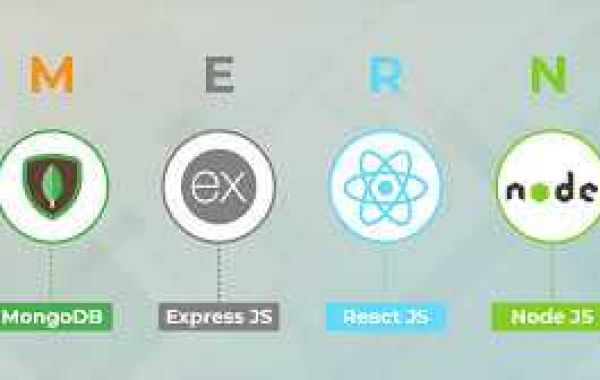In today's fast-paced digital world, creating affordable and secure applications is a top priority for many businesses. Enter MERN Stack Development, a powerful combination of technologies that promises to enhance enterprise applications with ease and efficiency. With its ability to provide both cost-effectiveness and robust features, the MERN stack is becoming the go-to solution for enterprises looking to thrive in the competitive tech landscape.
Introduction to MERN Stack
The MERN stack is a cutting-edge framework for developing dynamic web applications. It brings together four powerful technologies: MongoDB, Express.js, React, and Node.js. These tools work seamlessly to cover all aspects of an application, from data management to user interface.
- MongoDB is a NoSQL database known for its flexibility and scalability, making it ideal for managing diverse data types. Express.js is a lightweight web application framework that operates on Node.js, allowing for the creation of robust server-side applications. Node.js itself is a fast and efficient JavaScript runtime, perfect for handling multiple connections simultaneously.
- React, created by Facebook, is a library used to build interactive and responsive user interfaces. Its component-based architecture simplifies the development process and enhances user experience. By using JavaScript across the entire stack, developers can maintain a consistent coding language, streamlining the development process.
- The synergy of these technologies results in a highly efficient development environment. MongoDB’s schema-less design allows for quick iterations and changes. Express.js and Node.js provide a solid foundation for creating fast, scalable applications. React ensures that the user interface is dynamic and engaging.
- One of the standout features of the MERN stack is its ability to handle the full development cycle with ease. From managing databases with MongoDB to serving web content with Express.js and Node.js, to crafting rich user interfaces with React, the MERN stack offers a comprehensive solution. This makes it an attractive choice for developers looking to create modern, high-performance applications.
- Additionally, the open-source nature of all these technologies fosters a vibrant community of developers. This community continuously contributes to the improvement of each component, ensuring that the MERN stack remains at the forefront of web development.
By leveraging the power of the MERN stack, developers can create sophisticated applications that are both efficient and scalable, meeting the complex needs of today’s businesses.
Goode To Read: Top Node.js Frameworks: A Guide to Choosing the Right One in 2024
Cost-Effectiveness of MERN Stack Development
The MERN stack is incredibly cost-effective for several reasons.
- First, it uses JavaScript for both front-end and back-end development. This means you don't need separate developers for different parts of your application. A unified team can work on the entire project, which reduces labor costs and simplifies communication.
- Second, all the technologies in the MERN stack are open-source. MongoDB, Express.js, React, and Node.js are free to use. There are no licensing fees, which can save a significant amount of money, especially for startups and small businesses.
- Third, the development process is faster with the MERN stack. React’s reusable components speed up the creation of user interfaces. Node.js allows for efficient server-side operations. Express.js streamlines routing and middleware. All these factors contribute to quicker development cycles. Faster development means lower costs because you spend less on labor and resources.
- Additionally, the MERN stack’s extensive community support is a cost-saver. The active community continuously updates and improves these technologies. You can easily find solutions to problems, reducing the need for costly custom development. Access to numerous libraries and tools also accelerates the development process.
- Lastly, the scalability of the MERN stack means you won't need to overhaul your system as your business grows. MongoDB's flexibility allows you to scale your database effortlessly. Node.js handles multiple connections simultaneously, ensuring your app can grow without significant additional investment. This scalability means you avoid the high costs associated with migrating to new technologies as your needs evolve.
The MERN stack offers a budget-friendly solution for developing robust and scalable applications. Its single-language approach, open-source components, rapid development capabilities, strong community support, and scalability make it an attractive option for businesses aiming to maximize their development budget.
Scalability and Performance Benefits
Scalability and performance are vital for enterprise applications. The MERN stack stands out in these areas. Node.js, with its event-driven, non-blocking architecture, allows applications to handle many simultaneous connections efficiently. This makes it ideal for businesses expecting a high volume of traffic.
MongoDB's flexible schema design is another key factor. It allows you to store and manage large amounts of data without compromising performance. As your data grows, MongoDB scales horizontally, meaning you can add more servers to distribute the load.
Express.js further enhances performance by streamlining the backend. It simplifies server management, making it easier to handle complex routing and middleware tasks. This leads to faster response times and a more efficient server.
React, on the front end, is known for its speed and efficiency. Its virtual DOM (Document Object Model) ensures that only the necessary components are updated. This results in quicker rendering times and a smoother user experience.
Together, these technologies create a seamless flow of data and operations. The non-blocking architecture of Node.js ensures that your server remains responsive under heavy loads. MongoDB's scalability means you can handle growing datasets effortlessly. Express.js optimizes server-side operations, and React ensures a fast, responsive front end.
Additionally, the MERN stack's use of JavaScript throughout the entire stack streamlines development. This consistency reduces the risk of errors and improves overall performance. Developers can share code between the server and client, speeding up the development process.
Read More: 8+ Top Node.js Development Trends and Predictions in 2024
Security Features in MERN Stack
Security is critical for any enterprise application, and the MERN stack excels in this area. MongoDB, for example, offers robust encryption features to protect sensitive data. It also provides secure access controls, ensuring that only authorized users can access certain information. This adds a layer of protection to your data management.
Node.js contributes significantly to security. It supports various security protocols and tools that help safeguard applications from common threats like SQL injection, cross-site scripting (XSS), and cross-site request forgery (CSRF). By using Node.js, developers can implement strong security measures right from the server side.
Express.js, part of the backend, allows for secure handling of user data and transactions. It offers middleware solutions to add additional security layers, such as data validation and sanitation, to protect against malicious inputs.
React, on the front end, helps prevent security vulnerabilities by providing ways to manage state and data flow securely. For example, it can mitigate XSS attacks by escaping any values before they are rendered in the user interface.
The combined use of these technologies ensures that the entire application, from the database to the user interface, is secure. By leveraging the built-in security features of MongoDB, Node.js, Express.js, and React, developers can build applications that are resilient against a wide range of cyber threats. This comprehensive approach to security makes the MERN stack a trusted choice for building enterprise applications.
Building Feature-Rich Applications
The MERN stack empowers developers to create applications packed with features that meet varied business needs.
- With React, developers can build dynamic and interactive user interfaces. Its component-based architecture lets them reuse code, making the development process faster and more efficient. This means businesses can roll out new features quickly without starting from scratch.
- MongoDB adds another layer of flexibility. It allows developers to manage diverse data types and structures easily. This flexibility ensures that applications can store and retrieve data efficiently, regardless of the complexity of the data. As a result, businesses can implement complex features like advanced search functions, data analytics, and user personalization with ease.
- Express.js and Node.js simplify the development of backend logic. Express.js provides a straightforward way to handle routing and middleware, making it easy to manage server-side operations. Node.js, known for its speed, ensures that server-side tasks are executed swiftly. This combination makes it possible to develop robust features like real-time updates, notifications, and secure user authentication systems.
- Another benefit is the MERN stack's ability to integrate with other technologies. Whether it's adding third-party APIs or incorporating additional tools, the MERN stack offers the flexibility needed to adapt and grow. This adaptability means businesses can continually enhance their applications with new features as market demands evolve.
- The use of JavaScript across the entire stack is another advantage. It allows developers to share code between the frontend and backend. This reduces development time and ensures consistency across the application. Features like form validations, data processing, and even complex business logic can be implemented more efficiently.
- Moreover, the active developer community surrounding the MERN stack provides a wealth of resources. From libraries and plugins to forums and tutorials, developers have access to tools and knowledge that can accelerate feature development. This community support helps in quickly overcoming challenges and implementing new functionalities.
Trusted Development Community
The MERN stack is backed by a vibrant and active development community. This collective effort drives continuous improvements and keeps the stack at the cutting edge of web development. Whether you’re looking for tutorials, libraries, or troubleshooting advice, the MERN community offers a wealth of resources to help you along the way.
One of the standout features of this community is the abundance of open-source contributions. Developers from around the world share their code, plugins, and tools, which can significantly accelerate your development process. This collaborative environment means that you don’t have to reinvent the wheel; chances are, someone has already solved the problem you’re facing. Forums and online communities are also incredibly supportive. Platforms like Stack Overflow, GitHub, and various dedicated MERN Stack forums are filled with experienced developers who are willing to offer advice and solutions. This makes it easier to overcome any hurdles you may encounter during development.
In addition to problem-solving, the MERN community is also a hub for innovation. Developers frequently share new techniques, best practices, and emerging trends. By staying engaged with the community, you can keep your skills sharp and stay ahead of industry changes. This access to cutting-edge knowledge helps you build more robust and modern applications. The community’s focus on documentation is another key benefit. Comprehensive guides and documentation are available for each component of the MERN stack—MongoDB, Express.js, React, and Node.js. These resources provide step-by-step instructions, making it easier for developers of all skill levels to get started and progress.
Another advantage is the regular updates and patches released by the community. These updates ensure that your applications are secure, efficient, and up-to-date with the latest technological advancements. Knowing that you have a community actively working to improve the tools you use adds an extra layer of reliability and trust.
Seamless Integration with Other Technologies
The MERN stack is highly flexible, making it easy to integrate with various technologies. This adaptability allows businesses to connect their applications to third-party APIs, enhancing functionality and user experience.
For example, MongoDB can work effortlessly with data analytics tools to provide insights into user behavior. This helps businesses make informed decisions. React, on the other hand, can be paired with different libraries to add new features like real-time chat or notifications. This modular approach makes it easy to add functionalities as needed. Node.js and Express.js also contribute to seamless integration. These technologies support a wide range of plugins and middleware. This makes it simple to incorporate services like payment gateways, authentication systems, and cloud storage solutions. As a result, businesses can offer a comprehensive range of features without starting from scratch.
Another advantage is the MERN stack’s compatibility with microservices architecture. Microservices allow developers to build small, independent modules that work together. This makes it easier to update or add new features without disrupting the entire application. For instance, you can use a separate microservice for handling user authentication while another manages data storage. This modularity increases the application’s flexibility and scalability. The open-source nature of the MERN stack further enhances its integrative capabilities. Developers have access to a wide array of tools and libraries. These resources can be easily incorporated into existing projects. For example, you can add machine learning capabilities to your application by integrating with TensorFlow or other AI libraries. This expands the possibilities for what your application can achieve.
Quick Development and Deployment
The MERN stack is known for its rapid development and deployment capabilities. Companies using the MEAN stack, which is similar to the MERN stack, report a 50% reduction in development time compared to traditional stacks. Companies using the MEAN stack, which is similar to the MERN stack, report a 50% reduction in development time compared to traditional stacks. This speed advantage means businesses can bring their applications to market faster, gaining a competitive edge.
Furthermore, the rising demand for MERN stack developers is evident, as job listings for MEAN stack developers have surged by 200% over the past few years. This trend reflects the increasing popularity and effectiveness of these technologies.
Several factors contribute to the quick development cycle of the MERN stack.
- First, it uses a single language, JavaScript, across the entire stack. This consistency reduces the complexity of switching between different languages and speeds up the coding process. Developers can easily transition between front-end and back-end tasks without the need for context switching, which streamlines the workflow.
- Second, React's reusable components make it easy to build and maintain user interfaces. These components can be quickly assembled, modified, and reused, which significantly reduces the time required to develop new features. This modular approach allows developers to focus on building robust functionality without having to start from scratch each time.
- Node.js, with its non-blocking architecture, also plays a crucial role in speeding up development. It can handle multiple tasks simultaneously, making the development process more efficient. This efficiency extends to deployment, as applications built with Node.js can be quickly tested and deployed.
- Express.js, with its minimalistic framework, simplifies server-side development. It provides a robust set of features for web and mobile applications, which allows developers to create scalable applications with minimal effort.
Also Read: Top 20 React Libraries and Frameworks to Look Out for in 2024
Real-World Success Stories
Many startups have turned to the MERN stack for their initial builds. This choice is no accident; the stack's efficiency and reliability are proven in the real world. For instance, about 35% of new tech startups opt for the MEAN stack, which is closely related to MERN, for their projects about 35% of new tech startups choose the MEAN stack, closely related to MERN, for their projects..
One notable example is the social media platform, Instagram. Although initially built using the Django framework, Instagram has incorporated React into its front end to enhance user experience. React’s dynamic interface capabilities have allowed Instagram to deliver a more responsive and engaging user experience.
Another success story is the popular e-commerce platform, Shopify. While Shopify uses various technologies, its integration of React has significantly improved the speed and interactivity of their user interface. This makes shopping smoother and more enjoyable for customers.
Small businesses and startups are not the only ones benefiting. Large enterprises like Netflix have adopted Node.js, a core component of the MERN stack, to handle their vast amounts of data and high user traffic efficiently. This has led to faster content delivery and improved user satisfaction.
Healthcare startups are also leveraging the MERN stack. For example, a telemedicine app used MongoDB to manage patient data securely and Node.js for real-time communication between doctors and patients. This combination allowed for a scalable, efficient, and secure application, addressing the complex needs of the healthcare industry.
Struggling to keep your enterprise applications scalable and efficient? Leverage our React Js Development Services to build robust solutions that meet your business needs.
Conclusion
The MERN stack provides a versatile and powerful solution for businesses aiming to create cost-effective, secure, and feature-rich applications. By leveraging JavaScript across the entire stack, companies can streamline development processes and reduce costs. The MERN stack also excels in enabling the creation of feature-rich applications.
React's component-based architecture allows for the rapid development of dynamic user interfaces. MongoDB and Express.js simplify data management and server-side operations, making it easier to implement complex features.Lastly, the vibrant and active development community around the MERN stack offers invaluable support.
Access to numerous libraries, tools, and expert advice ensures that developers can overcome challenges quickly and stay updated with the latest best practices.In summary, the MERN stack is an excellent choice for businesses looking to build modern, efficient, and scalable applications. Its comprehensive features and strong community support make it a leading technology stack in today's digital landscape.








